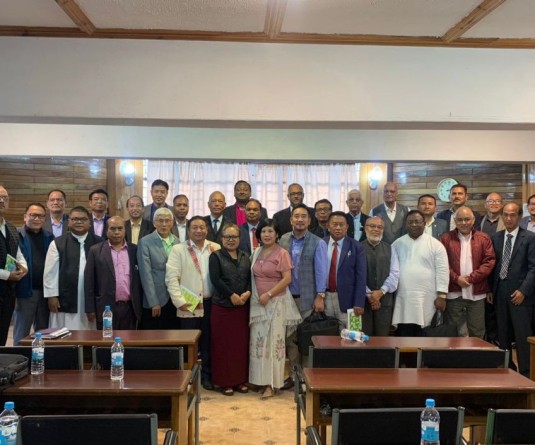
Atuo Angami
Kohima
Commuters of the Kohima City have long been benefiting from the generosity of some relatively affluent individuals, who have committed themselves in providing community service in the form of running private city buses. Unlike many other Municipal Councils/Corporations, which have their own fleet of public transport, Kohima’s public transport system is an agglomeration of mostly private owners, unifying for the sole purpose of providing efficient affordable bus services for decades now. With the advancement of engineering and technology, city buses have transformed over time, for achieving better efficiency, comfort and more recently, lesser emission of environment pollutants. Today, there are vast array of buses available which are not only equipped with modern technologies such as GPS trackers, on board/ dash cameras, hydraulic lifts, panic buttons, information display systems, PA systems, etc. but also runs on alternative fuels like CNG and electricity. For instance, electric buses in particular has lesser emission, has brand value, free from rising diesel/petrol cost, cheaper maintenance, quieter operation and can avail various incentives for procuring. The Government of India (GoI) is promoting these recent innovations through introduction of schemes like Faster Adoption and Manufacturing of (Hybrid &) Electric Vehicles(FAME).
Various air quality monitoring sources have shown that Kohima and Dimapur are exposed to harmful air pollution levels beyond permissible limits even with the absence of major air polluting factories and industries. This may be related to the increasing number of vehicles in the Cities. Automobile emissions such as Carbon Monoxide (CO), Ozone, Sulfur Dioxide(SO), Nitrogen Dioxide(NO), Lead, Particulate Matter(PM) and other toxic air pollutants can lead to serious health issues like asthma, cancer, lung infections, etc. Elderly citizens and children are found to be more susceptible to these health hazards. Due to the adverse implications of polluted air, India has made it a fundamental right to breathe clean air through the National Green Tribunal (NGT) in 2014.
Inorder to regulate the output of air pollutants from internal combustion engines and spark-ignition engines equipment, including motor vehicles, India follows the Bharat Stage Emission Standards(BS). Presently the accepted norm, since 2017, is the BS-IV, but by April 2020, India is set to adopt the BS-VI norms; which would mean after this, legally there should not be any more vehicle sales from authorised dealers or registration of vehicles at regional transport offices, of non BS-VI compliant vehicles. As per Indian Emissions Regulations(ARAI), BS-VI norms shall implement use of BS-VI fuel grade with only 10 parts per million (ppm) sulphur content, compared to 50ppm in BS-IV fuel. The most hazardous components of pollutants like PM 2.5 and PM 10, which can cause cancer, shall be reduced by a phenomenal 80%, in case of diesel engines. It should be noted that diesel engines generate more pollutants compared to petrol engines; hence, a major concern bears on the diesel city buses that ply for almost 10 hours a day within our City limits.
Considering the development of modern-day public transport buses and consequences of harmful emissions, our city buses need to be upgraded and modernised. Whereas the viability of acquiring the coveted e-buses or even CNG buses maybe questionable for now, there has to be interventions in upgrading the existing fleet, even in terms of equipments and meeting the regulated emission norms. For instance, the GPS trackers, if fitted in buses, can greatly enhance the traffic management, increase reliability and improve the service in general. Similarly, the hydraulic lifts can help accessibility for disabled and elderly people, panic buttons for emergency situations, information display systems for passenger convenience, etc. With respect to cutting the emission levels, existing bus fleet will have to be analysed and older buses should be replaced strategically without hampering the city public transport service.
The City Bus Owners Union Kohima can play a vital role in taking the collective decision in the right direction, while the Municipal Council can strongly advocate suitable standards for city buses. Kohima Smart City Development Ltd. can facilitate the process by drawing in the appropriate vehicle manufacturing companies and financial institutions for financing, assist in acquiring and installing necessary equipment and features provide display information and improve the public transport management. The Transport Authority also should take note of the upcoming developments and adhere strictly to the latest norms. A collective effort from all stakeholders shall ensure that public transportation is safe, convenient, and comfortable; more importantly, environment remains lesser polluted and we inhale clean air each day as we go bustling about in our scenic hilly town of Kohima.




